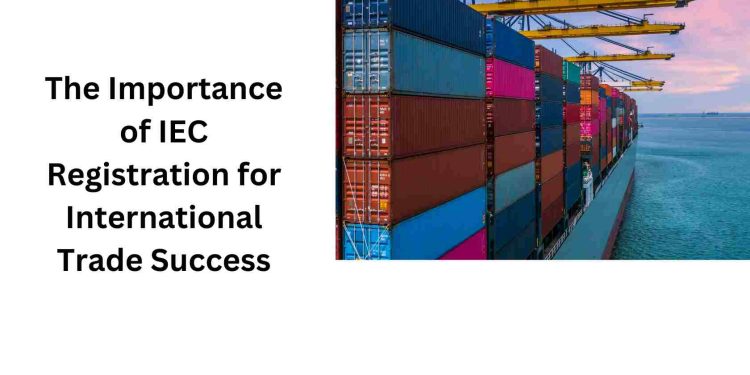IEC registration stands for Import Export Code registration. It is a 10-digit unique identification number issued by the Directorate General of Foreign Trade (DGFT), Ministry of Commerce and Industry, Government of India, to Indian entities or individuals engaged in international trade activities.
IEC registration is mandatory for any business or individual involved in importing or exporting goods and services from India. It serves as a primary document for recognition by government authorities and enables businesses to engage in legal trade transactions across international borders.
Facilitates Legitimate Trade Transactions:
IEC registration is a mandatory requirement for businesses involved in import and export activities. It serves as a proof of identity for the entity engaged in international trade and ensures compliance with legal regulations. Without an IEC, businesses may encounter obstacles in customs clearance, face legal repercussions, or even risk their transactions being deemed illegal.
Enables Access to Global Markets:
One of the primary advantages of IEC registration is its role in enabling businesses to access global markets with ease. Whether it’s sourcing raw materials from international suppliers or exporting finished products to overseas buyers, having an IEC opens doors to a world of opportunities. It enhances a company’s credibility in the eyes of foreign partners and regulatory authorities, thereby fostering trust and facilitating smoother transactions.
Eligibility for Government Schemes and Benefits:
Many government schemes and benefits aimed at promoting exports and bolstering international trade are accessible only to businesses with a valid IEC registration. These schemes may include incentives, subsidies, or preferential treatment in certain trade agreements. By obtaining an IEC, businesses can avail themselves of these advantages, thereby enhancing their competitiveness in the global market.
Streamlines Documentation and Compliance:
IEC registration streamlines the documentation process associated with international trade transactions. It provides a standardized identification number that simplifies customs procedures, banking transactions, and regulatory filings. This not only saves time and effort but also reduces the likelihood of errors or discrepancies in documentation, minimizing the risk of delays or penalties.
Enhances Credibility and Trust:
In the dynamic landscape of international trade, trust and credibility play a crucial role in fostering successful business relationships. Having an IEC registration lends legitimacy to a business and instills confidence in potential partners, suppliers, and customers alike. It signals to stakeholders that the business is serious about its commitment to international trade and is compliant with relevant regulations, thereby reducing the perceived risk associated with conducting transactions.
Ensures Smooth Customs Clearance:
Customs clearance can be a daunting process fraught with complexities, especially for businesses engaging in cross-border trade. However, with an IEC registration in hand, businesses can navigate customs procedures more efficiently. The unique identification provided by the IEC facilitates the smooth processing of import and export shipments, minimizes delays at ports of entry or exit, and mitigates the risk of goods being held up due to documentation discrepancies or regulatory issues.
Expedited Foreign Exchange Transactions:
International trade involves currency conversion and foreign exchange transactions, which can be cumbersome without the proper documentation in place. Having an IEC registration enables businesses to conduct foreign exchange transactions seamlessly, as it serves as a prerequisite for opening foreign currency accounts with banks. This facilitates smoother payment settlements with overseas suppliers and enables businesses to hedge against currency fluctuations effectively.
Paves the Way for Strategic Partnerships:
In the interconnected world of global commerce, strategic partnerships, and collaborations can be instrumental in driving business growth and expanding market reach. However, many potential partners, including distributors, agents, and joint venture counterparts, may require proof of IEC registration as a prerequisite for collaboration. By obtaining an IEC, businesses can demonstrate their readiness to engage in international trade partnerships, thereby opening doors to mutually beneficial opportunities for growth and expansion.
Note: You can also Apply for IEC Code Renewal
Ensures Compliance with Export Control Regulations:
In addition to facilitating trade, IEC registration also serves as a mechanism for ensuring compliance with export control regulations and sanctions imposed by regulatory authorities. Businesses engaged in the export of sensitive goods or technologies are required to obtain various licenses and permits, and IEC registration acts as a foundational requirement in this regard. By adhering to export control regulations, businesses can mitigate the risk of inadvertently violating trade restrictions and facing legal consequences.
Conclusion:
In conclusion, Import Export Code (IEC) registration is not just a bureaucratic formality; it is a strategic imperative for businesses aiming to succeed in the realm of international trade. By obtaining an IEC, businesses can unlock a multitude of benefits, including access to global markets, eligibility for government incentives, and streamlined compliance with regulatory requirements. In today’s competitive landscape, where the barriers to international trade are diminishing, having an IEC registration can provide businesses with a significant advantage, positioning them for success in the global marketplace. Therefore, businesses should prioritize obtaining and maintaining their IEC registration as an integral part of their international trade strategy







